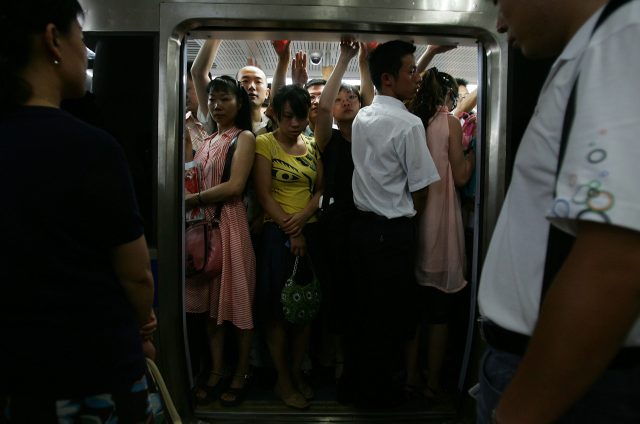Credit: Guang Niu/Getty Images

Last November I wrote about the Chinese government plan to quantify and gamify the ‘good behaviour’ of every Chinese citizen in the form of a single ‘social credit’ score. It would work like a (financial) credit rating or points on a driving license, except that it would encompass multiple dimensions of behaviour.
A recent report by Peter Dockrill for ScienceAlert, explains the comprehensive nature of the system:
“For positive personal and social acts – such as paying bills on time, engaging in charity, and properly sorting your recycling – citizens get their score bumped up, which gives them access to perks, like better credit facilities, cheaper public transport, and even shorter wait times for hospital services.
“But if you break the rules, beware. People who are late with payments, or caught jaywalking or smoking in non-smoking areas, will be punished.”
Dockrill says that the Social Credit System is “expected to be fully operational by 2020″ and that in some areas pilot schemes are already up and running.
Quite clearly intended as an instrument of social control, the regime is making no attempt to hide that fact:
“According to China’s Communist Party, the system will ‘allow the trustworthy to roam freely under heaven while making it hard for the discredited to take a single step’.”
From a western perspective, the most shocking thing about the System is that it seems to have widespread popular support:
“Back home, surveys show the early system is already popular with socially advantaged citizens who are already enjoying the perks of pilot programs.”
According to Ipsos, 87% of Chinese citizens believe their country is heading in the “right direction”, but 47% see “moral decline” as a major threat. Both of these numbers are unusually high (compared to other countries), which could be interpreted as evidence that the Chinese trust their leaders more than they trust one another.
It is in the nature of a totalitarian regime to undermine the ‘horizontal’ ties between citizens so that their vertical ties to the central authority can become all important. China is not the totalitarian state that it was, but the era of (economic) liberalisation has been marked by rapid urbanisation and large-scale internal migrations – upheavals that have disrupted the re-accumulation of social capital. This has left a gap, which the artificial substitute of the Social Credit System is intended to fill.
While commentary in the West has focused on how the SCS might be used to punish dissidents and reward the favoured few, that is not the most significant thing about it. A regime that has prison camps on the one hand and the privileges of Communist Party membership on the other, already has the extremes covered.
The most important thing about the system is that it is designed to manage the great bulk of the Chinese population, not just the elites or the ‘enemies of the state’. As such, it needs to keep the majority happy – or at least the bulk of China’s growing middle class. Which is why the carrots offered by the system are as important as the stick.
According to Dockrill, these carrots include better credit facilities, cheaper public transport and shorter waiting times for services. However, it strikes me that these things are secured at the expense of those who don’t qualify for them because their social credit scores are too low. In other words, there is a qualifying in-group that effectively exploits the non-qualifying out-group: the insiders get to queue-jump ahead of the outsiders; and the outsiders pay more for certain items so that the insiders can pay less.
Of course, if you’re redistributing carrots from a small out-group to a much larger in-group, you have to chop them into tiny slices. Thus, for a substantial part of the population to gain noticeable advantages from a zero-sum arrangement, the disadvantaged group also has to be fairly substantial – a deeply divisive dynamic.
Who would be most likely to fall into the out-group? Given the ostensible purpose of the Social Credit System, it would be those most prone to impulsive, anti-social, self-sabatoging behaviour. In all likelihood, therefore, we can expect those with low social credit scores to be disproportionally young, male, poorly educated and under-employed.
The Social Credit System will render such individuals officially untrustworthy – and systematically limit their opportunities in mainstream society and the legitimate economy.
It’s hard to think of a more effective way of expanding the criminal population.










Join the discussion
Join like minded readers that support our journalism by becoming a paid subscriber
To join the discussion in the comments, become a paid subscriber.
Join like minded readers that support our journalism, read unlimited articles and enjoy other subscriber-only benefits.
Subscribe